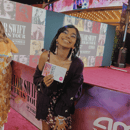Like many members of my generation, Disney Channel and Nickelodeon played an integral role in my teenage years. Of course, I idolized the badass female characters who weren’t afraid to speak their minds, such as Jade West from Victorious and the titular character of Jessie. But as a young Indian American trying to find her place in this world, I loved seeing characters that looked like me.
Growing up, I connected with Ravi from Jessie, Baljeet from Phineas & Ferb, and any other South Asian characters that were featured in my favorite shows. Even in such a small, tokenized capacity, it excited me to see my ethnic background included onscreen. Plus, I admired the actors who played them; their success as South Asians in the predominantly white entertainment industry inspired me.
But over the years, I’ve come to realize that this isn’t the kind of representation Indian Americans deserve. Thinking back to the pride my teenage self felt because of Ravi and Baljeet makes me cringe. Their appearance, personality, and storylines all heavily incorporated harmful stereotypes about Indian culture. If a character’s primary purpose is to check a box in terms of diversity — or worse, portray racially charged caricature that serves as the butt of jokes — then they shouldn’t be written at all. They instill the notion in impressionable teenage audiences that Indian-American kids are nerdy, academic overachievers who are physically unattractive and socially awkward. This perpetuates the bullying and ostracization of those who share my ethnic background, utilizing a racial identity as ammunition.
I’m a huge theater and choir kid, but until recently, I felt out of place pursuing these artistic passions as a brown girl. In both high school and college, most students in these programs were white. Sometimes, even my brown peers would call me “whitewashed” when I mentioned such interests. Plus, despite my strong vocal range, I certainly didn’t fit the typecast of many of my dream roles. For example, I delusionally auditioned for Rapunzel when my high school did Into the Woods, and I wasn’t even surprised when I didn’t get the part. (I did have an ensemble/featured dancer role in Mamma Mia the next year, so hey, that’s something.)
This is why Avantika’s portrayal of Karen in the 2024 musical remake of Mean Girls speaks to me in unmatched ways. She reimagined a traditionally white character to incorporate her race, but retained many of Karen’s qualities that we’ve loved for years.
She showed me that Indian American girls can be much more than what racial stereotypes make us out to be. We can sing and dance on stage instead of burying our noses in a book. We can love the color pink, rock a cute outfit, and have a brain fart sometimes, and that doesn’t take away from our ethnic background at all.
In Apr. 2024, Avantika received backlash after rumors swirled of her starring as Rapunzel in a live-action remake of Tangled. Looking at her Instagram comments during this time disheartened me — just because she doesn’t fit Rapunzel’s look in the Disney classic doesn’t mean she can’t flawlessly bring the character to life. And I’m not the only one who thinks a Brown girl can play a Disney princess.
Fellow Desi actress Maitreyi Ramakrishnan, best known for her portrayal of Devi in Netflix’s Never Have I Ever, has also expressed that Rapunzel is one of her dream roles.
“You know what’d be really cool? I think Rapunzel should be a South Asian girl. Because hear me out, no one knows what it feels like to be trapped in your room, not able to go out because your mother is telling you no, without giving you an actual proper reason like brown girls do. It’s true,” she told CBS in 2022.
I’m proud of Avantika and Maitreyi for paving a path for themselves that I never had the confidence to. I don’t want future generations of Indian American kids to fall into the same trap that I did, of pigeonholing ourselves based on what society tells us about our race.
We need more media representation that Avantika and Maitreyi are showcasing onscreen and less of the token “nerd” character that’s the butt of offensive jokes.


